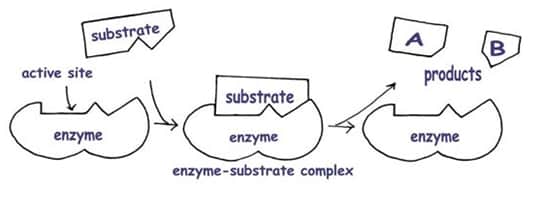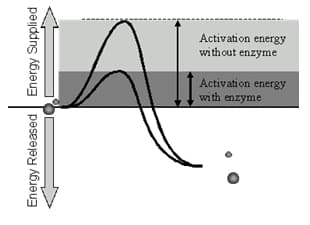Enzymes are specialized proteins that speed up chemical reactions (biological catalysts) Without enzymes, cellular chemical reactions could not occur fast enough to maintain life.
Enzyme Activity:
– enzyme binds to the reactants, called the substrate(s), of a chemical reaction
– the substrate joins with the enzyme at the enzymes active site forming an enzyme-substrate complex
– after the enzyme-substrate complex forms the enzyme-catalyzed reaction occurs
– enzyme releases the product(s) and the enzyme is ready to bind to more substrate

Enzyme Characteristics:
– enzymes are reusable
– enzymes are specific to their particular substrate(s) as their active sites are designed to precisely fit and accept the substrate molecules
How do Enzymes speed up chemical reactions?
– lower the amount of energy that must be supplied for the reaction to occur (activiation energy)
Thousands of different chemical reactions must occur in cells to make life possible.
Each reaction requires its own specialized enzyme in order to proceed efficiently.
Ex. Reactions that Require Enzymes: dehydration synthesis, hydrolysis, digestion of food, cellular respiration, protein synthesis, photosynthesis and many more


thanks for the information
Enzymes are biological molecules that catalyze chemical reactions.A living system controls its activity through enzymes. An enzyme is a protein molecule that is a biological catalyst with three characteristics. First, the basic function of an enzyme is to increase the rate of a reaction. Most cellular reactions occur about a million times faster than they would in the absence of an enzyme. Second, most enzymes act specifically with only one reactant to produce products. In enzymatic reactions, the molecules at the beginning of the process, called substrates, are converted into different molecules, called products. Almost all chemical reactions in a biological cell need enzymes in order to occur at rates sufficient for life. Since enzymes are selective for their substrates and speed up only a few reactions from among many possibilities, the set of enzymes made in a cell determines which metabolic pathways occur in that cell.